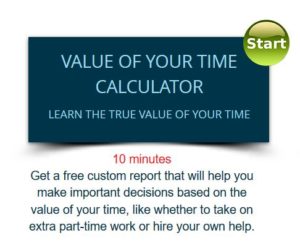How much do you value your time? Answers may vary. Some may say “very valuable,” while another person may get very specific with “$15/hour.” Another person, if asked to give up time doing something they love, might say they’d need $100/hour, which directly contradicts the $15/hour previously. So how much do you really value your time?
I took a survey from ClearerThinking.org and found that I am full of contradictions when it comes to my time AND money. (Although, as you’ll see below, I’m also fairly consistent.)
For example, I have a fairly low amount I would accept per hour if given a specific task. It’s not that I want to work at that rate forever, but if you say “I’ll give you $X” to do Y for an hour, my X is pretty low.
However, my patience is NOT low. Through a variety of questions, ClearerThinking.org figured out that I would essentially only wait 1 minute to get a $100 gift card, which makes my hour worth $6,000!
 On the flip side, if I already have money, I’m not too willing to trade it in for time. For example, if ClearerThinking.org could give me a device that would reduce a 4 hour task to 2 minutes, I’d pay precisely $0 for that device. If you gave it to me for free, I’d take it, but I’m certainly not going to part with my money even if it saves me time!
On the flip side, if I already have money, I’m not too willing to trade it in for time. For example, if ClearerThinking.org could give me a device that would reduce a 4 hour task to 2 minutes, I’d pay precisely $0 for that device. If you gave it to me for free, I’d take it, but I’m certainly not going to part with my money even if it saves me time!
Through a series of more questions, ClearerThinking.org tries to suss out your response to various scenarios and trade-offs. They then send you a customized report with these stats, but also summaries. My good news was that, when I took the report, I was making slightly more per hour at my full-time job than I truly valued my time at. But the difference was only pennies. Now, as a freelancer and consultant, I need to make up for the difference in paying for my own benefits, like insurance, office equipment, sick days, etc., but I’ve used my time value from the report as a guide.
Another fun component of this survey is that, through various questions, scenarios and angles, the survey writers can even determine how consistent I am. My consistency score is 0.07, which makes me 95% more consistent than those who’ve used this same tool.
And on a qualitative level, the researchers have me summed up:
“It’s possible that you’re more reluctant than you should be to spend money in order to free up time — for instance, by paying for time-saving services or purchasing time-saving devices.”
Additionally, the researchers do some math for us. For example, based on my stats:
 “If you’re considering waiting in line for 20 minutes to get something free, ask yourself whether you’d be willing to pay $7.22 for that thing. If not, you probably shouldn’t wait.”
“If you’re considering waiting in line for 20 minutes to get something free, ask yourself whether you’d be willing to pay $7.22 for that thing. If not, you probably shouldn’t wait.”
“If you’re debating whether to purchase an item worth $20, you should spend much less than 55.38 minutes making up your mind. If you spend longer, the value of the time you’ve devoted to deciding whether to buy the item will exceed the value of the item itself!”
Am I the only one geeking out about this tool? If you’re with me, head over to ClearerThinking.org. The Time-Money Calculator can be found here. They have some other tools I might explore too, such as Tactics for Happier Living and How Rational are you, Really?
The Time-Money Calculator is so valuable, in my opinion, because most of us are inconsistent in our use and value of time. Our jobs are often the most clear-cut value of time we have. We know what we make per hour or year and we, generally, only want to move up from there. It’s hard to take less unless other major benefits come into play.
However, when it comes to other money coming in, like freelancing, or money going out, like paying a housekeeping or lawn mowing service, the value on our own time gets muddled with what we like or don’t like to do. That’s emotional, not rational. And while I don’t want to remove emotion from my life or decisions, this Time-Money Calculator provided a really interesting way to look at things.
Take the survey, any of them, and let me know how you fare!